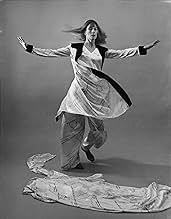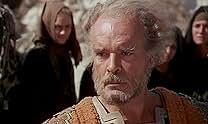NOTE IMDb
6,9/10
1,8 k
MA NOTE
Ajouter une intrigue dans votre langueThe women of Troy face enslavement after the fall of their city.The women of Troy face enslavement after the fall of their city.The women of Troy face enslavement after the fall of their city.
- Réalisation
- Scénario
- Casting principal
- Récompenses
- 2 victoires au total
Pat Beckett
- Woman
- (as Pat Becket)
Elsie Pittas
- Woman
- (as Ersie Pittas)
María García Alonso
- Woman
- (as Maria G. Alonso)
Nilda Álvarez
- Woman
- (as Nilda Alvarez)
Avis à la une
It's all over now, the Greeks have taken Troy and have killed every male in the place. The wooden horse idea worked beautifully and now it's to divide up the spoils which in this case is the women of Troy, both high and low born.
Highest born of the lot is Hecuba, widow of the late King Priam and mother of Hector and Paris, both dead now. Imagine Eleanor of Aquitaine if her husband and all those loving sons had been slain in a cataclysm. Then you have some idea of what Katharine Hepburn's performance as Hecuba is all about.
Hepburn is aided and abetted in this film by three other international stars and each of their stories is told in relation to Hecuba. As Cassandra, Hepburn's daughter, Genevieve Bujold takes refuge in madness. The Gods gave her the gift of prophecy with the caveat that no one would believe her prophecies and it's all come too true. Vanessa Redgrave is Andromache, widow of Hector who has her little son killed by order of the Greeks to make the triumph complete before becoming part of the Spartan king's harem.
Then there's the one whose hormones started it all. Fair Helen, older and not terribly wiser, played by Irene Papas. Her scenes with Hepburn have some real bite to them, the best in the film. And Irene Papas is the only Greek in this Greek tragedy.
It's a powerful film, an anti-war film made at the time Vietnam was still a war zone. It only had limited release at the time it was out, it wasn't exactly box office material.
But it's a good film adaption of a classic and nice that one of Euripedes plays is preserved for us by four of the best players around of the female genders.
In the years labeled BC good woman's parts were actually being written.
Highest born of the lot is Hecuba, widow of the late King Priam and mother of Hector and Paris, both dead now. Imagine Eleanor of Aquitaine if her husband and all those loving sons had been slain in a cataclysm. Then you have some idea of what Katharine Hepburn's performance as Hecuba is all about.
Hepburn is aided and abetted in this film by three other international stars and each of their stories is told in relation to Hecuba. As Cassandra, Hepburn's daughter, Genevieve Bujold takes refuge in madness. The Gods gave her the gift of prophecy with the caveat that no one would believe her prophecies and it's all come too true. Vanessa Redgrave is Andromache, widow of Hector who has her little son killed by order of the Greeks to make the triumph complete before becoming part of the Spartan king's harem.
Then there's the one whose hormones started it all. Fair Helen, older and not terribly wiser, played by Irene Papas. Her scenes with Hepburn have some real bite to them, the best in the film. And Irene Papas is the only Greek in this Greek tragedy.
It's a powerful film, an anti-war film made at the time Vietnam was still a war zone. It only had limited release at the time it was out, it wasn't exactly box office material.
But it's a good film adaption of a classic and nice that one of Euripedes plays is preserved for us by four of the best players around of the female genders.
In the years labeled BC good woman's parts were actually being written.
This is a great version of Euripides' Trojan women. They got an all-star cast that truly does justice to the original play. The movie is done very much like the play, but this is quite a positive thing, it doesn't end up being some idiotic Keanu Reaves "Much Ado About Nothing".
Katharine Hepburn gives her all as Hecuba, the Queen of the now destroyed Troy, and all of the other actresses give great renditions. Irene Pappas, the national actress of Greece, did a magnificent job as Helen, the woman who started it all. Brian Blessed played the messenger as only he could, and Vanessa Redgrave and Genevieve Bujold truly capture the pain and anguish of these women as they face their inevitable fate.
The music, too, really did set the atmosphere, I could feel a chill up my spine when they played that otherwise simple melody. The costumes are suitably appropriate, and I'd love to know where they found that ancient-looking wall that is meant to represent Troy, it adds a nice touch.
All in all, this is a movie that you have to see at least once in your life, your outlook on the horrors of war will never be the same.
Katharine Hepburn gives her all as Hecuba, the Queen of the now destroyed Troy, and all of the other actresses give great renditions. Irene Pappas, the national actress of Greece, did a magnificent job as Helen, the woman who started it all. Brian Blessed played the messenger as only he could, and Vanessa Redgrave and Genevieve Bujold truly capture the pain and anguish of these women as they face their inevitable fate.
The music, too, really did set the atmosphere, I could feel a chill up my spine when they played that otherwise simple melody. The costumes are suitably appropriate, and I'd love to know where they found that ancient-looking wall that is meant to represent Troy, it adds a nice touch.
All in all, this is a movie that you have to see at least once in your life, your outlook on the horrors of war will never be the same.
A greek tragedy is very hard to be made into a movie. In my opinion it is really almost impossible as there are often long monologues that can't be cut or improved in any way. Nevertheless Michael Cacoyannis tried, and succeded in filming the best anti-war work ever written. The film is a bit stagy but that is how it should be. Being the editor of his film too, he manages to create a unique atmosphere that in the beginning seems a bit akward but as the plot develops you understand that it is the ideal. The scenery is excellent. We see only the total destruction of the city and that's all we need to see as the narrations must "draw" the total picture of the inner part of the city in our minds. All the performances are first-rate. Katharine Hepburn is heart-breaking as Hecuba. She cries for her lost sons, husband and city. She loves the city and hates the Greeks who give her, the queen of Troy, as slave.
G.Bujold is also excellent as Cassandra. She seems crazy, but she is fully aware of the fate. She delivers a balanced performance avoiding exagerations. Irene Pappas is stunning. Looking more beautiful than ever, she manages to stand opposite Katharine Hepburn's Hecuba and deliver an excellent and utterly convincing performance. But the great performance of the picture is surely Vanessa Redgrave's. Her Adromache seems strange at the beginning but when her character is fully developed, you understand the genius of her performance. This picture is a must-see not only for the excellent performances delivered but four of the greatest actresses of their generation but also for the importance of Euripides play.
G.Bujold is also excellent as Cassandra. She seems crazy, but she is fully aware of the fate. She delivers a balanced performance avoiding exagerations. Irene Pappas is stunning. Looking more beautiful than ever, she manages to stand opposite Katharine Hepburn's Hecuba and deliver an excellent and utterly convincing performance. But the great performance of the picture is surely Vanessa Redgrave's. Her Adromache seems strange at the beginning but when her character is fully developed, you understand the genius of her performance. This picture is a must-see not only for the excellent performances delivered but four of the greatest actresses of their generation but also for the importance of Euripides play.
This film was shown at my art school in the early 90s to accompany reading the Greek play for class. It is beautifully produced -- the location and the lighting is exquisite, and makes the characters achingly beautiful in the midst of the tattered, gritty, treacherous war being waged around them. This film appears to be timeless...the cinematography is perfect; it does not appear to be an "old" or 'historical' film, and this luminescent quality helps younger viewers focus on the story (rather than struggle with history or epic readings or overlooking outdated film techniques). In fact, the movie is so well made, and the women appear so fresh and real, that as a college student I had no idea this movie was made in the early 70s, until I read a screen bio of Redgrave and was shocked that the movie is several decades "old." The viewer is pulled into the landscape by the profoundly beautiful Mediterranean surroundings, the intense acting, and raw emotionality the actors portray. This production successfully creates the ancient Greek ideal of tragedy, where the viewer experiences some personal transformation along with the characters. Quite memorable, even 15 years after seeing it -- and worth the time investment for a longer film.
Mr. Rodriquez comment "your outlook on the horrors of war will never be the same" is so true. The only movie that explains it best is Trojan Women. As a victim of WWII the movie is the only thing that truly explains the horrible experience. Once you are a victim of War and no one helps, you continue to be a victim. One is left alone without the familiar support system like family, language and ethnic group. Under all the humiliation and tragedies, you keep saying to yourself "this is so unfair cause I did nothing to deserve this, I merely was born. Whoever came up with the idea: All is fair in love and WAR, must have been a sadistic and selfish human being. Please watch Trojan Women because it is a must for ending wars.
Le saviez-vous
- AnecdotesThe Edith Hamilton translation of "The Trojan Women", which is used in this film, premiered on the Broadway stage in 1938. It was immediately acclaimed as being superior to the antiquated Gilbert Murray translation, which was the standard version used then.
- GaffesWhen Queen Hecuba cradles the dead body of her grandson Astyanax' corpse, actor Alberto Sanz' belly is seen moving up and down, showing he is still very much alive.
- Versions alternativesPortuguese version, "As Troianas", runs 109 minutes, with original soundtrack and Portuguese subtitles, as approved by the Government censorship.
- ConnexionsFeatured in Katharine Hepburn: All About Me (1993)
Meilleurs choix
Connectez-vous pour évaluer et suivre la liste de favoris afin de recevoir des recommandations personnalisées
- How long is The Trojan Women?Alimenté par Alexa
Détails
- Date de sortie
- Pays d’origine
- Langue
- Aussi connu sous le nom de
- The Trojan Women
- Lieux de tournage
- Société de production
- Voir plus de crédits d'entreprise sur IMDbPro
Box-office
- Montant brut aux États-Unis et au Canada
- 110 428 $US
- Durée1 heure 45 minutes
- Mixage
- Rapport de forme
- 1.66 : 1
Contribuer à cette page
Suggérer une modification ou ajouter du contenu manquant

Lacune principale
By what name was Les Troyennes (1971) officially released in India in English?
Répondre





























